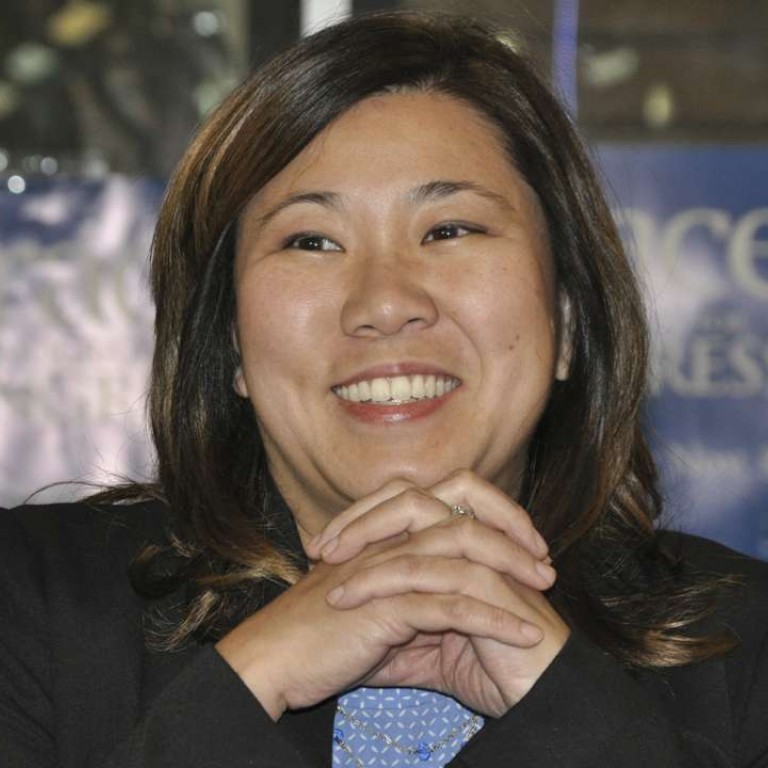
Why a US congresswoman focused on improving Asian American voters’ turnout on election day
Grace Meng says getting out the vote is key to banishing stereotypes
Securing a third term in US Congress wasn’t Grace Meng’s only goal this election season: the Democrat wanted Asian Americans to make their voices heard and vote – whether for Hillary Clinton or Donald Trump.
Meng won just under 65 per cent of the votes cast in the race for New York’s sixth district, located in Queens, and home to nearly a dozen ethnically diverse communities, including 340,000 Chinese Americans and 65,000 Korean Americans.
If our voting population does not increase, it would only do us harm
As Tuesday neared, Meng ratcheted up her efforts to boost turnout in her constituency. Traditionally, Asian Americans have been less likely to vote than members of other ethnic groups and many had never cast a ballot, she said. Some were not aware an election was even taking place.
“We want to make sure our community is also exercising their power and their rights at the poll sites,” she said before voting began. “Voting is something so many people in our country have literally fought for.”
To help residents get a better understanding of the process, she created an oversized mock-up of the ballot with instructions and the names of candidates for the races for the White House, Senate, House of Representatives, State Senate and State Assembly, written in Chinese, Korean, Hindi, Spanish and English. “The ballot can be confusing. I want to make sure everybody knows what it looks like.
“It’s public information how many Asian American people vote when the election is done,” Meng said. “The Asian population is increasing. If our voting population does not increase, it would only do us harm.”
Meng, a lawyer by training, started her political career in 2008 in the state assembly, representing the Queens neighbourhood of Flushing, a seat her father, Jimmy Meng, once held. But a cloud was cast over her political career in 2012, when her father pleaded guilty to one count of wire fraud for offering to bribe prosecutors to win a lower sentence for a businessman charged with tax fraud. He was sentenced to one month in prison and fined. “He has taken full responsibility of his actions and accepts all the consequences,” Grace Meng was quoted by The New York Times as saying after the hearing. She has emerged from the scandal with more support then ever, earning about 13 per cent more votes in last week’s election than in 2012.
The Queens native said she has encountered stereotyping and tackled it head-on. “When I finished my first campaign debate in 2008, a person told me he was surprised that I could speak English,” Meng said. “Many people see us Chinese Americans as aliens, not true Americans, once they see our face. We have dark hair and dark eyes, but we are Americans.”

She talked to her colleagues in the House and people from other ethnic groups about the problem, and decided getting out the vote was the best way to counter the narrow-mindedness. “As long as Chinese Americans do not vote, mainstream media and society will regard Chinese as not really caring for this country or taking America as our home,” she said.

The community was hit with a number of wake-up calls over race issues this year, she said. One of the loudest came in February, when Asian Americans protested in New York and around the country over the conviction of Peter Liang, who became the first New York City police officer to be convicted in a shooting in the line of duty after he killed an unarmed black man. The rallies were triggered by a perception that the police force had turned Liang into a scapegoat to ease racial tensions.
During her first campaign in 2008, when she was 33, Meng was forced to spend time introducing herself. This time around, she was a household name, an experienced politician who could focus on mobilising people to vote.
“[My team] has been making phone calls, sending emails, organising small meetings and reaching out to all kinds of community organisations and civic groups,” she said. “We put ads in Asian-language media. We encouraged the Asian community to come out to vote.
“Over the years, I have seen the Chinese community in Queens maturing in politics, and making history over and over again. I am proud of that.”

